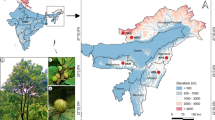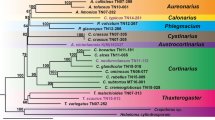Abstract
This study characterized the genetic relation-ships in the natural population of Pholiota nameko (Strophariaceae) from Japan based on the RFLPs of two regions of nuclear rDNA (ITS and IGS) and mitochondrial DNA and the RAPD profile of nuclear DNA. No intraspecific polymorphism in rDNA was found among 36 isolates of P. nameko used. By contrast, digests of mtDNAs by endonucleases HindIII and BglII produced RFLP patterns that distinguished all isolates except for 2, and clustered 36 wild isolates phenetically into three major similarity groups. However, these groups as obtained by analysis of mtDNA RFLPs did not reflect the geographic origin of the isolates. In RAPD analysis of nuclear DNA using three kinds of primers, every isolate showed its own distinct RAPD profile, but all isolates were clustered only into a large similarity group by phylogenetic analysis based on the RAPD profile. From these results, it is suggested that wild isolates of P. nameko distributed in Japan form a continuous genetic population that has conserved the genetic diversity.
Similar content being viewed by others
Author information
Authors and Affiliations
Additional information
Received: August 1, 2002 / Accepted: September 20, 2002
Acknowledgments We are grateful to Dr. Yasuyuki Hiratsuka, Director of Tottori Mycological Institute, for his critical reading of this manuscript.
Contribution no. 356 from the Tottori Mycological Institute
Correspondence to:T. Matsumoto
About this article
Cite this article
Obatake, Y., Matsumoto, T., Mimura, K. et al. Genetic relationships in the natural population of Pholiota nameko from Japan based on DNA polymorphisms. Mycoscience 43, 0463–0469 (2002). https://doi.org/10.1007/s102670200067
Issue Date:
DOI: https://doi.org/10.1007/s102670200067




